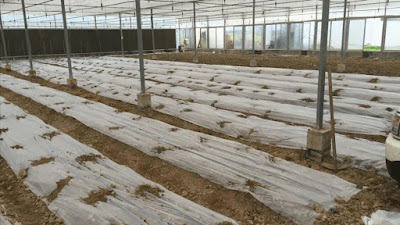Plastic film mulching is a measure commonly used by farmers and the surface is covered with agricultural film. Since the end of the 20th century, the agricultural land mulching technology has been gradually promoted, and it has become one of the main ways to increase the yield of crops such as grain, cotton, oil and vegetables. As an important agricultural product, mulch film plays an extremely significant role in agricultural development. In addition to raising ground temperature and maintaining water and fertilizer, it also has the effect of preventing pests and weeds. Farmers generally believe that the good use of plastic film can generally increase the production of agricultural products by 30% to 50%. However, the residual amount of mulch film in the soil accumulates year by year, which seriously damages the soil environment of cultivated land and restricts the growth of crops. The mulch film flows into the river with water or is burned, which will cause water pollution and air pollution. Therefore, regarding mulching, if you don't care about it in the early stage, the later treatment may also be a big trouble!
And despite the effective prevention and control measures of waste plastic film, there are still many people who take it seriously. The recycling of waste plastic film cannot bring direct economic benefits to farmers. The scattered recycling sites in the village do not recycle waste plastic film, and some farmers still buy plastic film with a thickness of less than 0.01 mm in order to reduce costs. Coupled with the high labor intensity of picking, most farmers will directly plough the waste plastic film into the soil, or discard it in the fields and ditches, resulting in heavy use and light recycling.
Mechanically picking up mulch is also a threshold. In agricultural production, the thin agricultural mulch (usually 0.005-0.008 mm used by local farmers) is broken after one production cycle, making it difficult to pick up, and the cost of manual recovery is high. There are three main problems in mechanically picking up mulch:
1) Farmers have insufficient awareness and enthusiasm for residual film recycling, and are unwilling to increase production costs to purchase residual film recycling machines for pick-up and recycling;
2) In Jiaxiang County, the plots with a larger planting area of mulched crops have high soil viscosity, and it is difficult for general machinery to solve the problem of separation of mulch and soil.
3) There is a lack of professional prevention and control teams in rural areas. Some public welfare positions are arranged in the villages, which are specially responsible for picking up plastic film.
For plastic film producers and operators, they are more willing to produce plastic films with a thickness of 0.006 to 0.008 mm. High-standard plastic films will increase production costs. For plastic film users, standard plastic film will increase the purchase cost and the cost of manual purchase later. Therefore, the promotion of standard plastic film is more difficult. The application prospect of fully biodegradable mulch film is great, but the technology is immature, which cannot accurately guarantee the demand for mulch film during the growing period of crops, which leads to the early degradation of biodegradable film during the growth period and a large reduction in crop yield; the price of fully biodegradable mulch film is also three times that of ordinary mulch film. , farmers' production costs increase, and biodegradable membranes are difficult to promote.
Therefore, in such cases, it is necessary to actively and efficiently use newspapers, TV, Internet and other media to expand the scope of green use of plastic film, and to publicize to the society and farmers the serious harm caused by discarded agricultural residues to crops and the environment of cultivated land; counties and towns should also combine science and technology. Training meetings are held separately for household entry and farmer training. Strengthening awareness and increasing supervision is the only way to prevent such phenomena.





No comments:
Post a Comment